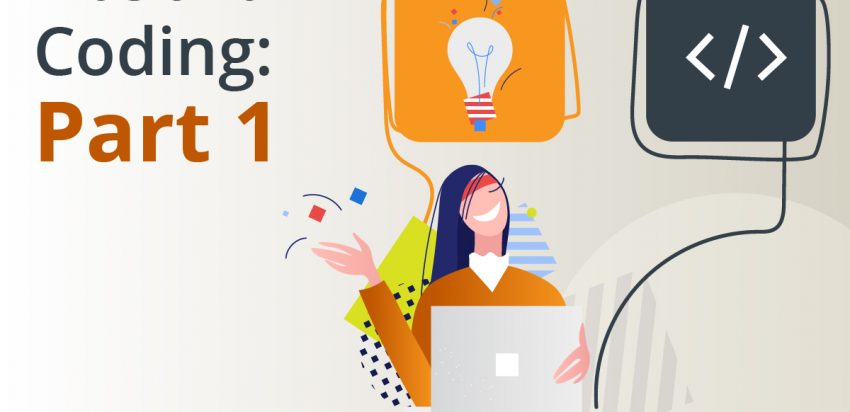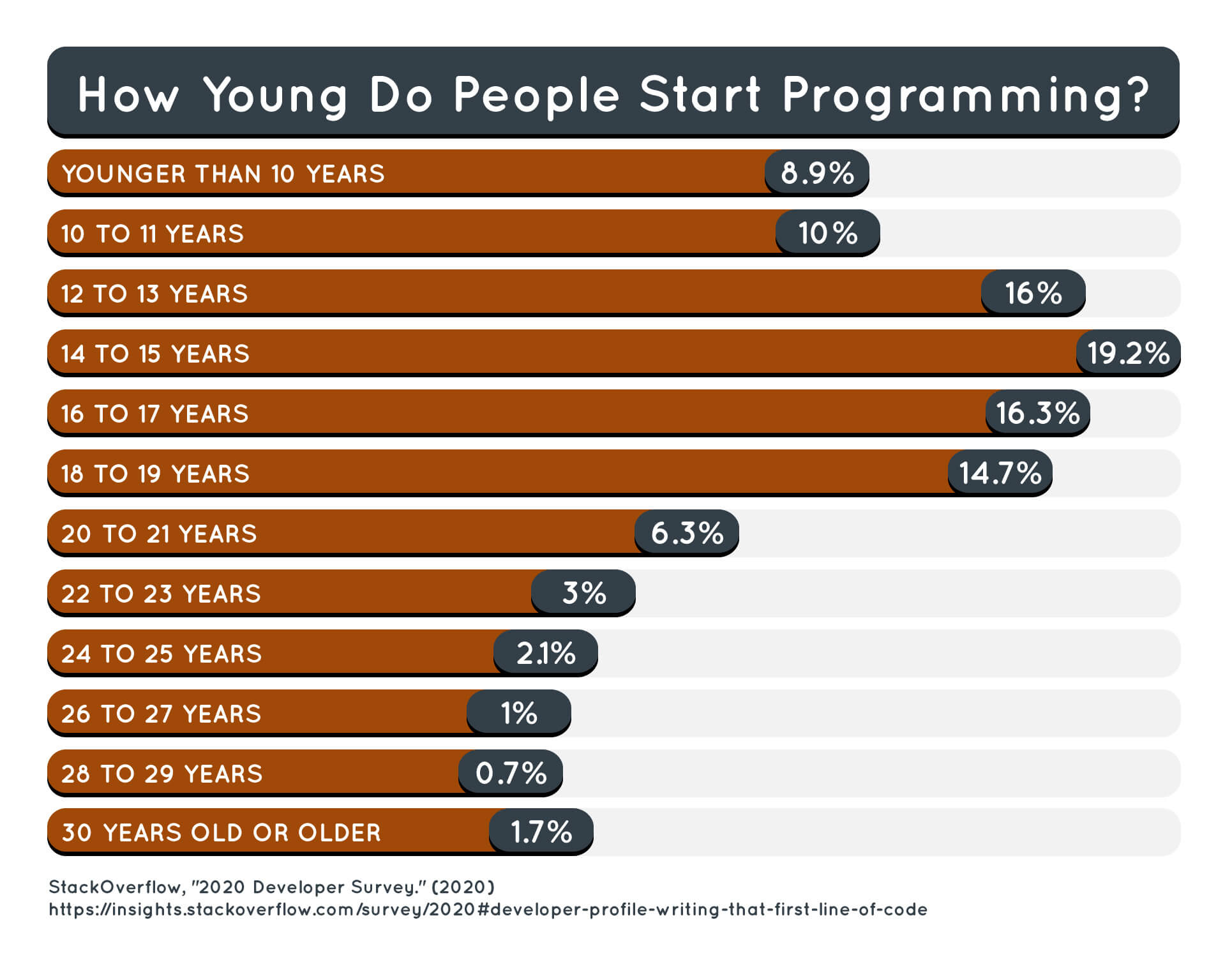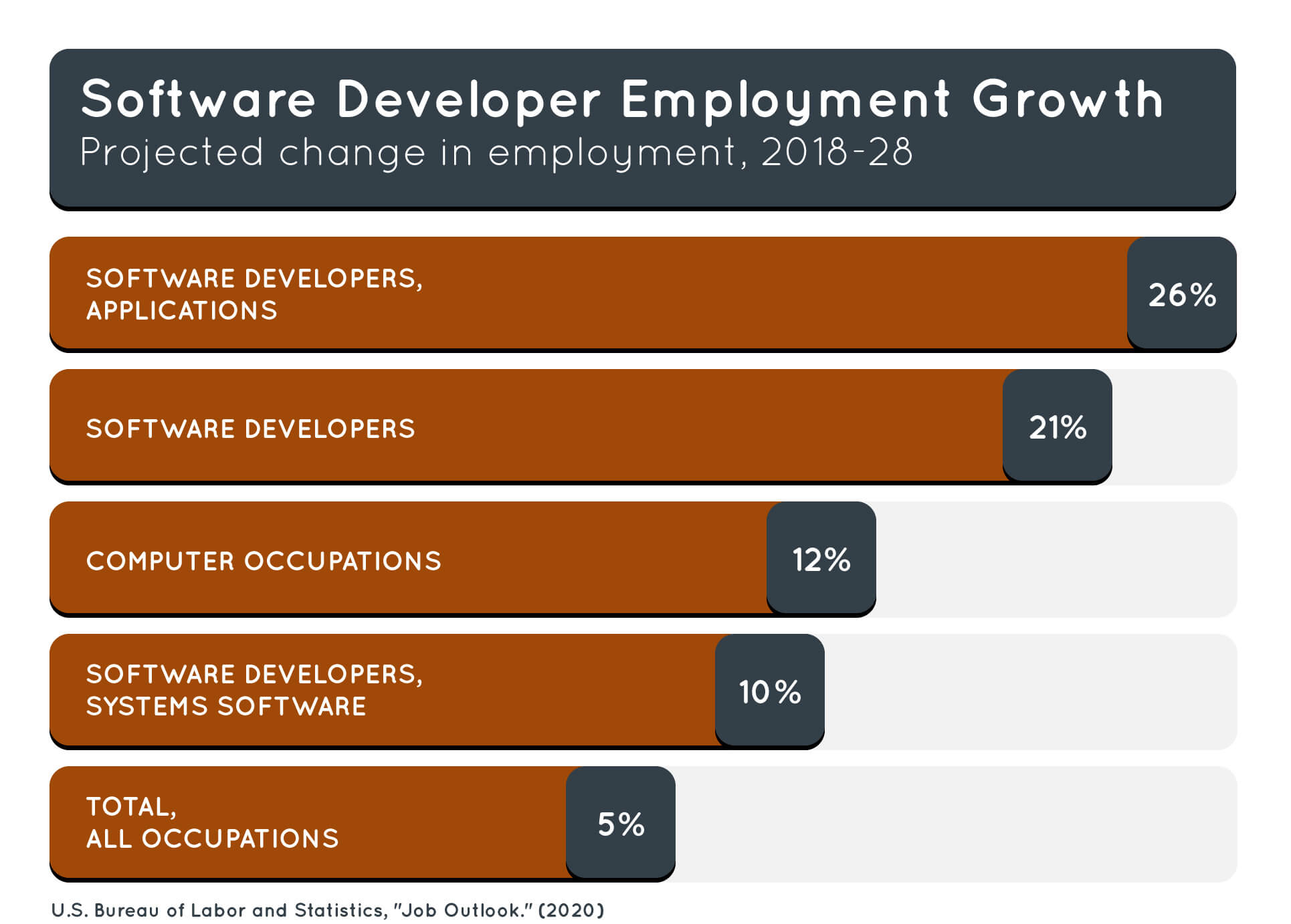7 Reasons Why Kids Should Learn to Code

This blog is part one of our three-part series on Kids and Coding. This first article explores a variety of benefits to learning web development skills at a young age, including real-world applications beyond technology. If you’re eager to get started learning from home, check out our blog of coding tools and resources, and explore our list of the 15 best coding books for kids for even more fun ways to start learning.
When most parents start curating extracurriculars for their children, they start with the basics: soccer, dance, maybe band practice. Their first idea for entertaining their elementary-schooler probably doesn’t include programming. But should it?
In recent years, the question of why kids should learn to code has spread like wildfire among parenting groups and educational centers. Interest in computer science has skyrocketed in recent years; according to statistics shared in the 2019 State of Computer Science Education Equity and Diversity Report, a full 45 percent of high schools now teach computer science, up from the 25 percent reported by Gallup in 2014.
In our increasingly digital world, parents want their kids to become computer-literate — and why wouldn’t they? Learning to code doesn’t just set students up for career opportunities later on in life; it also provides a host of soft skills and benefits that we will cover later in this article. But when should they start learning?
As it turns out, most professional developers started learning their trade early in life. According to Stack Overflow’s 2020 Developers survey, over 54 percent of professional developers wrote their first line of code by the time they turned 16. While it might seem intuitive to schedule a child’s first coding lesson into their high school curriculum, kids can start coding at a much younger age, sometimes as early as four years old.

While such an early introduction might seem odd at first glance, elementary-school coders are far more common than you might think. Nearly nine percent of developers polled in the above Stack Overflow survey began coding before their tenth birthday. Moreover, it seems likely that rationales for why kids should code will expand as digital literacy cements itself as a critical tenet of modern education.
The truth is, there is a plethora of reasons why kids should learn to code early. In this article, we’ll walk you through all of the best research-backed benefits for why kids should learn to code.
Let’s dive in!
1. Coding Boosts Problem-Solving Skills
Coding is, without a doubt, one of the most straightforward ways for children to boost their problem-solving skills.
But before we get into that, let’s take a step back and clarify the term. At its simplest definition, problem-solving refers to a person’s ability to tackle complex or novel situations in an efficient way. Someone with well-honed problem-solving skills weaves disparate skillsets such as creativity, emotional intelligence, research skills, collaboration, and decision-making into a cohesive and effective response.
In a programming context, coders are constantly challenged and asked to problem-solve. The practice all but requires them to break issues down into more manageable sub-problems, then progress through an iterative process of identifying, prioritizing, and implementing solutions. Thus, children start honing their problem-solving skills as soon as they take on their first coding challenge.
Research backs this point. One 2013 study conducted on five- and six-year-olds found that when children participate in a programming environment, they have “opportunities to develop mathematical concepts, problem-solving and social skills.” Moreover, the researchers noted that the study’s young participants often enjoyed their learning experience and were engaged in the age-appropriate programming games and activities provided to them.
That said, the benefits provided may vary according to age and relative cognitive development. For example, another study — conducted in 2014, and with four- to five-year-olds — noted that its participants demonstrated increased non-verbal cognitive abilities, but showed “no statistically significant difference in their problem-solving skills.”
This research indicates that even if your child doesn’t want to go into coding as an adult, establishing a practice of coding early in life will nevertheless help them build highly-transferable cognitive skills. Is it any wonder why kids should code?
Additional Resources:
- The Overlooked Benefits of Teaching Kids to Code — ReadWrite
- Coding for Children: Problem-Solving, Precision, and Going Unplugged — Oxford Owl
- Hands-On Coding Games for Preschoolers — Preschool Steam
2. Coding Improves Computational Thinking
One 2014 study found that coding games may help boost middle schoolers’ grasps on computational learning.
Never heard of computational thinking before? Simply defined, it is a branch of knowledge that involves expressing problems in a way that a computer would. Students who learn this model of thinking are encouraged to break down complex problems into smaller issues, thereby revealing underlying process patterns.
As researchers for an earlier study wrote on the matter, “We believe that children as young as ten can directly benefit from opportunities to engage in computational thinking […] Children can begin by solving puzzles on paper, continue on game boards, and ultimately complete their solutions on computers. Through this process, learners can be guided through increasingly complex algorithmic thinking activities that are built from their tacit knowledge and excitement about game play.”
This particular study concluded that engaging in computational thinking activities, children gained a better understanding of algorithmic thinking patterns. This improved grasp could translate well into mathematical pursuits and bolster a child’s problem-solving skills. These gains can have a clear positive impact on their performance as students — and, in the long term, as professionals.
Additional Resources:
- Why Thinking Like a Computer Builds Skills for Success — Teach Your Kids Code
- How Coding Teaches Kids Computational Thinking Skills — Red Tricycle
- 10 Classroom-Ready Computational Thinking Resources for K-12 — Getting Smart
3. Coding Encourages Persistence
Computer science is one of the few professional disciplines where it’s entirely acceptable to be near-constantly failing. Not only is failure immediately recognizable — i.e., a program “breaks,” and doesn’t work as intended — but success literally cannot be achieved until all errors are handled. Even the most straightforward programs require a coder to understand a set of problems and solve them; otherwise, the code won’t run as intended.
All professional developers have spent their fair share of late nights combing through Stack Overflow, struggling in vain to identify the most efficient way to tie the pieces of an application into a cohesive whole. Ask any developer what “dereferencing a null pointer” is — they’ll shudder in frustration, remembering hours spent attempting to track down an elusive bug.
But with all this frustration and failure comes a real, lifelong character benefit: persistence.
“Our data shows that many talented individuals simply don’t follow through on their commitments,” psychologist Angela Lee Duckworth once noted in a TED talk on the value of persistence. “In fact, in our data, grit is usually unrelated or even inversely proportional to measures of talent.”
Grit, as defined by Duckworth and her fellow psychologists, refers to the rare ability to persist past repeated failure. The most successful people in life are not those who shy away from failure, but rather those who view it as a helpful signal.
When children begin programming, they come to learn that failure is transient, and doesn’t have to be frustrating or a progress-stopper. Even small successes can provide the encouragement kids need to push through issues in their programming. Over time, this perseverance can bolster a child’s grit — and serve as one of the most important indicators of their future educational and career success.
Coding can help your child develop a growth mindset: a philosophy wherein one’s ability to learn can be improved upon, adjusted as needed, and stand firm against demoralizing failures. What better mentality could a child adopt early in life?
Additional Resources:
- Grit: The Power of Passion and Perseverance — TED
- How Coding Develops Resilience — Tynker
- Coding Can Be a Gift to Struggling Students. Let’s Give It to Them — EdSurge
4. Coding Teaches Creativity
Creativity, creativity, creativity; it’s something every early educator and parent is wholly concerned with, and yet it’s not a quality prized by most working adults.
Research by a team of UC Berkeley psychologists suggests that creativity tends to decrease as we age. The adage is true — adults tend to be less creative than children. By the time we reach our sunset years, we have effectively “unlearned” one of the most important skills in life.
“Creative people have rapid and effective responses that help them to achieve their life goals and allow them to enjoy the journey… [It] is both a skill set and a unique and individual personality structure that’s developed throughout childhood and fine-tuned in adolescence,” Notre Dame researcher Doireann O’Connor once noted.
So, how do we preserve a child’s creative skills as they age?
Experts suggest that kids should learn to code. As a practice, coding positions developers as “creators” or “world-builders” within a programming environment — by definition, the discipline requires creative thinking and an experimental mindset.
With programming, kids are constantly prompted to experiment. Once they understand basic functionalities, they can continually ask themselves, What if I tried this? Would that work?
Computers provide live feedback, which further encourages young coders to find workable solutions to whatever challenges they face. Age-appropriate coding projects prompt children to tell stories, animate characters, and develop unique programs, which empower them to combine their logical and systematic thinking with creative, artistic, and intuitive learning.
The result? Access to lifelong creativity skills!
Additional Resources:
- Art, Tech, and Coding: Why Kids Need an Education that Marries Creativity and Technical Know-How — Marketing Magazine
- How Learning to Code Develops Kids’ Creativity — Tynker
- Creative Coding Challenges for Scratch — MIT Scratch Studio
5. Coding Helps Teach Digital Literacy
Why should kids learn to code?
Technology surrounds us; it supports our work, facilitates communication, enables social connectivity, and upholds nearly every industry in the economy. In the modern world, being able to understand and engage with technology isn’t just good to have — it’s a necessity for navigating an increasingly digitized society. Children need to know technology; in other words, they need to be digitally literate.
Digital literacy is a broad term. Generally speaking, it refers to a person’s ability to understand and engage with technology in a thoughtful, meaningful way. Topics such as internet safety, cyberbullying, digital footprints, and online ethics all fall under the purview of digital literacy.
For example, digital-literate children can research topics online, find relevant information, and then think critically about the sources they identified. From there, they can formulate their own opinion and, if one is needed, a response. They can also manage their digital presence and communicate with others via online channels.
It is worth noting that many kids — and teens in particular — are already more adept at digital life and better equipped to handle the information overload that comes with constant online interconnection than prior generations.
While coding hasn’t yet risen to the forefront as a day-to-day necessity for online denizens, it probably will become one in a few years. Already, all online communication is facilitated via coded programs; some games, like Minecraft, allow users to code their own features. It seems reasonable to think that programming will become a necessary literacy in its own right, as much as navigating a social media platform or internet research ever was.
To borrow a quote from Annette Lee, the author of Coding Literacy, “If you don’t know how to program, you can carry on perfectly fine with life. But this is soon going to change.”
It seems best for parents to encourage their children to get ahead of the curve by learning to code early.
Additional Resources:
- What is Digital Literacy and Why Does it Matter? — Renaissance
- Understanding the Differences Between Digital Literacy and Coding — Junior Coders
- Coding for Kids: The New ABC’s of Digital Education — Teach Magazine
6. Coding is a Career-Building Skill
The importance of programming cannot be understated in our economy, which is now overwhelmingly driven by technology.
The Bureau of Labor Statistics reports that job openings for software developers are slated to grow 21 percent between 2018 and 2028 — that’s more than four times the average rate for all careers. Moreover, not all employers require their developers to obtain a four-year degree; many are so strapped for talent that they welcome anyone with the necessary skills and working potential.

But here’s why kids should code even if they aren’t interested in becoming full-time developers: they can still benefit professionally from learning a coding language or two. Programming savvy is valuable, regardless of your child’s educational background or job interest. In some cases, it may even be the capability that ultimately boosts them above their job market competitors!
The biggest hurdle is just mastering that first programming language — but once they do, they will be well-positioned to learn different languages, frameworks, and technologies later on in life.
Additional Resources:
- Why Coding is an Investment in Your Child’s Future — Tynker
- Coding is the Skill You Need Today if You Want a Job in One of the Highest-Paying Industries — Monster
- 4 Major Reasons You Need Coding Skills Even if You Don’t Want to Be an Engineer — The Muse
7. Coding Improves Confidence and Communication Skills
It’s time to debunk a popular misconception; coding is far from a solo activity. Excepting freelancers and one-person operations, most software programmers work in teams and collectively strive to achieve development goals.
One study published in Information and Software Technology found that developer performance is so inextricably tied to team dynamics that to improve one, businesses need to address the other. As the researchers write: “Enhancing performance experiences requires integration of soft factors, such as communication, team spirit, team identity, and values, into the overall development process.”
Sure; coding doesn’t need to be a group endeavor, but it provides an excellent context for collaboration. Enrolling your child in a programming class could be a great way to develop their team-building and communication skills — and having well-tuned communication skills empowers children to navigate social environments, collaborate with others, perform well academically, and achieve their goals.
Most importantly, kids learn to develop confidence and a healthy self-image. A coding project teaches your child that any problem is solvable, that any obstacle can be overcome with repeated creative effort and teamwork. Could there be a better reason for why kids should learn to code? Probably not.
Additional Resources:
- Coding Influences Your Student’s Self-Esteem — Good Coderz
- Coding Robots for Kids Can Help Them Build Confidence — The Gadget Flow
- Three Ways Coding Enhances Communication Skills — Tynker
Final Thoughts: Why Kids Should Code
It’s safe to say that coding is one of the most constructive hobbies for your child to adopt, especially since it can help them develop persistence, communication, creativity, and higher-order thinking.
Yes, learning to code also sets your child up for potentially lucrative career opportunities, but it offers children so much more than that. A modern parent can’t go wrong by encouraging their child to program. Start with some of the resources above and introduce your child to developmentally appropriate programming today!

 Live Chat
Live Chat